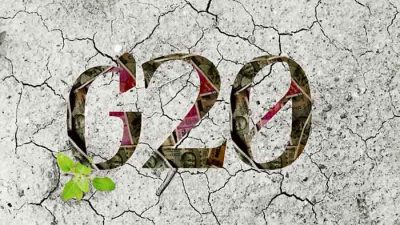G20, the Ukraine War and the Global Economic Crisis
United States and its allies accused of hampering progress within the Global South

All Global Research articles can be read in 51 languages by activating the Translate Website button below the author’s name (desktop version)
To receive Global Research’s Daily Newsletter (selected articles), click here.
Follow us on Instagram and Twitter and subscribe to our Telegram Channel. Feel free to repost and share widely Global Research articles.
***
In late February the Group of 20 (G20) held a summit meeting in Bengaluru, India to discuss the economic challenges facing the world.
These states are ranked as the major 19 national economies and the European Union (EU) based upon their gross domestic product, the total sum of goods and services produced within a society.
With the myriad of problems facing humanity after the impact of a pandemic which either curtailed or completely closed down industrial production, service delivery and educational institutions resulting in supply-chain shortages and the emergence of an inflationary spiral not experienced in the capitalist countries since the early 1980s, many people were looking to the G20 summit to provide some answers to the worsening crisis. However, the escalating Cold War between the United States and the Russian Federation overshadowed all other issues.
The situation at the G20 was so strained that it became impossible for the gathering to agree on a joint statement. Antony Blinken, the Secretary of State for the administration of President Joe Biden, insisted upon language which condemned Russia for its special military operation in Ukraine. At one point during the meeting, there were hostile exchanges between Russian Foreign Minister Sergei Lavrov and his U.S. counterpart in the personage of Blinken.
Over the last year, the Biden administration has provided $115 billion to Ukraine aimed at continuing the conflict. The U.S. has sabotaged any efforts to hold substantive negotiations between Kiev and Moscow. Unprecedented sanctions have been imposed on Russia by Washington and its European Union (EU) allies. (See this)
A report by investigative journalist Seymour Hersh documenting that the Biden administration had rendered dysfunctional the Nord Stream pipeline connecting Russia and Germany. Prior to the Russian intervention in Ukraine, many states in Europe were supplied with natural gas and oil by Moscow.
The U.S. has refused to acknowledge the report by Hersh since the corporate and government-controlled media has suppressed the story. When the Russian Ambassador to the United Nations Vassily Nebenzia to attempted to discuss the Hersh findings at the Security Council, the U.S. refused to comment on the question while accusing Moscow of promoting “conspiracy theories.”
Nonetheless, Hersh has never been considered a “conspiracy theorist.” For many years he wrote for established commercial publications in the U.S. In the late 1960s during the Vietnam War, he exposed the details of a massacre of hundreds of Vietnamese civilians at My Lai through the Dispatch News Service International which carried reports about the often hidden crimes carried out by the Pentagon. (See this)
Decades later in 2004, just one year after the U.S. invasion and occupation of Iraq, Hersh as a writer for the New Yorker, exposed the torture factory set up at Abu Ghraib by the Pentagon where Iraqi soldiers and civilians were beaten, sexually assaulted and killed. The revelations surrounding these crimes against humanity served to build even more opposition to the occupation ordered by then President George W. Bush, Jr. (See this)
A further cover-up of the actual role of the Biden administration in Ukraine is taking place within the context of the G20 and other international forums. A desperate attempt to win the support of nations and geo-political regions outside of North America and Western Europe has had the opposite effect. The overwhelming majority of governments and its peoples have refused to categorically denounce Russia while seeking to maintain and strengthen relations with Moscow.
The African Union (AU), representing 1.3 billion people across 55 member-states, rejected the appeals by Washington to endorse the war effort by the Pentagon. AU leaders have consistently called for a diplomatic resolution to the escalating conventional war in Eastern and Southern Ukraine. This same position has been echoed by the Non-aligned Movement (NAM) and all of the socialist countries.
G20 Leader Expressed Displeasure over the Stalemate
Since the full G20 Summit in February, there have been two additional ministerial meetings which have been plagued with same problems involving the U.S. proxy war in Ukraine. Events unfolding on the battlefield and in the burgeoning air war between Washington and Moscow are also reflected diplomatically during talks over economic policy.
G20 negotiator for India, which holds the rotating presidency for this year, Amitabh Kant, was recently quoted as saying:
“Europe cannot bring growth, poverty, global debt, all developmental issues to a standstill across the world. Especially when the south is suffering, especially when 75 countries are suffering from global debt, especially when one-third of the world is in recession, especially when 200 million people have gone below poverty line. Can that one war bring the entire world to a standstill? Nutrition has been impacted, health outcomes have been impacted, learning outcomes have been impacted, people have become stunted and wasted and we are just concerned with one Russia and Ukraine war. The world needs to move on and Europe needs to find a solution to its challenges.” (See this)
Imperialist War and Economic Turbulence
These concerns are becoming even more pertinent due to the developing financial crisis in the U.S. and Western Europe. During the week of March 6-10 two major banks, Silvergate and Silicon Valley, heavily anchored in the tech and cryptocurrency sectors of the economy collapsed.
After these shocks to the financial system which drove down stock markets in the U.S. and internationally, another bank, Signature, was forced to close by the Federal Deposit Insurance Corporation (FDIC) which guarantees deposits of customers and businesses up to $250,000. In an attempt to calm fears among other bankers and the population as a whole, Biden on March 13, made a statement over the mass media pledging that the Treasury Department in consultation with several financial institutions would guarantee the deposits of individuals and businesses at Signature.
Biden brief comments on March 13 were delivered while no questions from journalists were allowed. These events on March 13 seems to stabilize the markets for that day. However, as the week went on, major sell offs of stocks occurred. By mid-week, yet another bank, First Republic, was deemed to be in danger as well. Several larger banks then pledged to provide $30 billion in liquidity to save the financial institution from collapse.
As if this was not enough, on March 15, Credit Suisse, based in Switzerland, was facing serious problems which threatened its existence. The bank went to the Saudi Arabia National Bank, one of its largest investors, to ask for an increase in liquidity. Saudi Arabia refused to accept the offer saying that increasing its level of investment beyond 10% would place it in a different regulatory category. It appears as if the risk of such a proposition far outweighed its unlikely benefits. (See this)
European Central Bank (ECB) President Christine Lagarde made her announcement on March 16 to raise interest rates by some 50 basis-point. Since some financial analysts are attributing the rapidly worsening instability in the banking industry to the sharp rise of interest rates imposed by the Federal Reserve Bank Chairman Jerome Powell, many investors were startled at Lagarde’s announcement. Nonetheless, the pledge by Swiss National Bank to bailout the troubled Credit Suisse in all likelihood influenced the ECB position.
Bloomberg website which follows the financial markets noted that:
“The Swiss National Bank has come to the rescue, offering liquidity through a covered-loan facility. Credit Suisse said in the early hours of Thursday (March 16) that it would borrow as much as 50 billion francs ($54 billion)… Following its February meeting, the ECB all but promised a 50 basis-point advance in the deposit rate to 3% this month, saying it will then ‘evaluate the subsequent path’ of monetary policy.”
As early as March 6, Chase Bank CEO Jamie Dimon, told Bloomberg News that the war in Ukraine and deteriorating relations with China was the major concern of his financial institution and that these issues were of a graver danger than any domestic problem. Such a statement is a clear indication of the connection between the financial downturn and the militarist foreign policy of the Biden administration. (See this)
If these international tensions are troubling to the largest banks in the world, the impact on the working class, farmers and the oppressed are surely devastating. A war is being waged as well against the masses of people in the present period. From France, to Britain to the U.S., austerity measures are being imposed on the workers and farmers. The character of the unfolding situation requires the independent organization of the people to transform the economic crises into opportunities for a protracted struggle to end the capitalist and imperialist system.
*
Note to readers: Please click the share buttons above or below. Follow us on Instagram and Twitter and subscribe to our Telegram Channel. Feel free to repost and share widely Global Research articles.
Abayomi Azikiwe is the editor of the Pan-African News Wire. He is a regular contributor to Global Research.
Featured image is from Countercurrents


